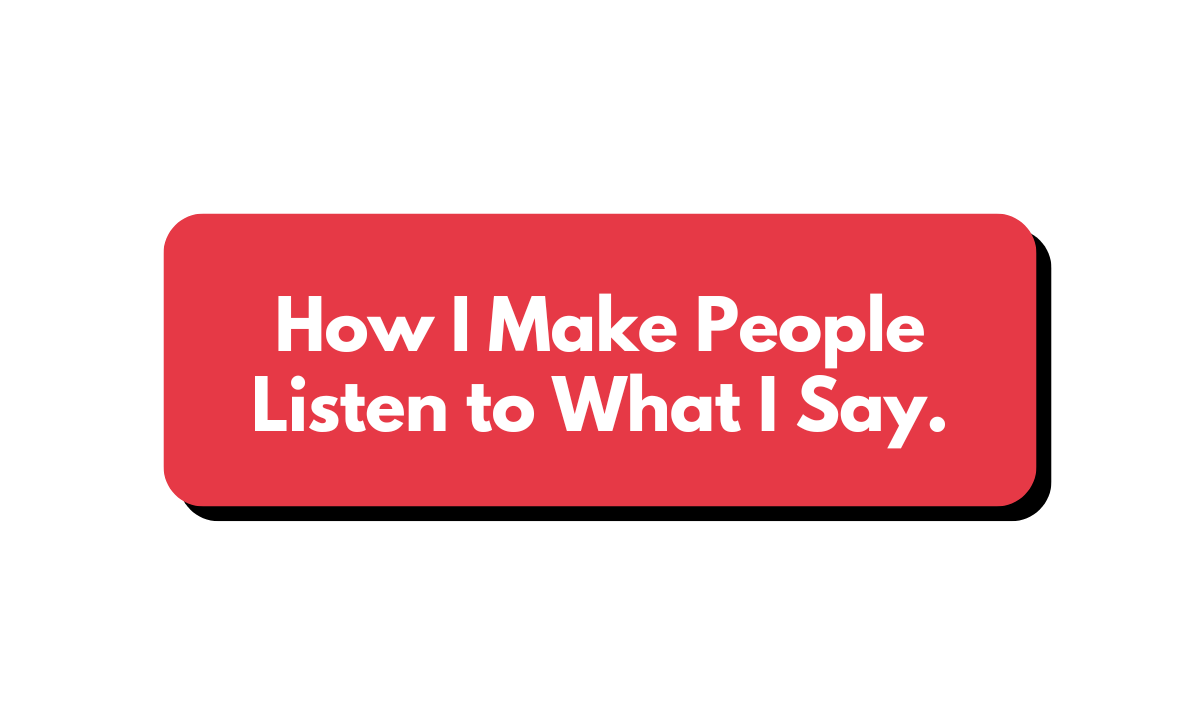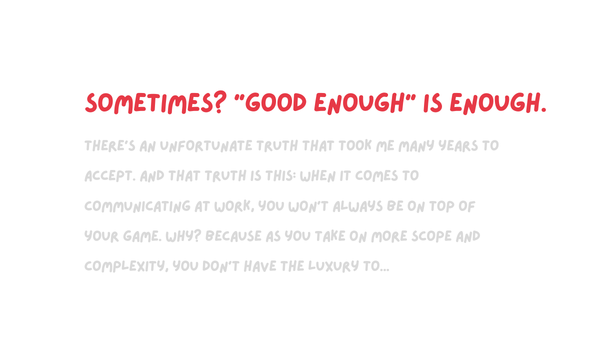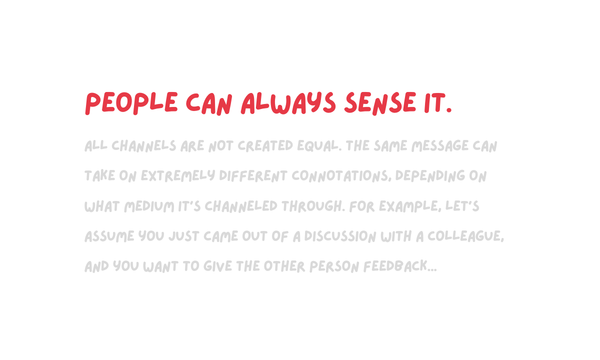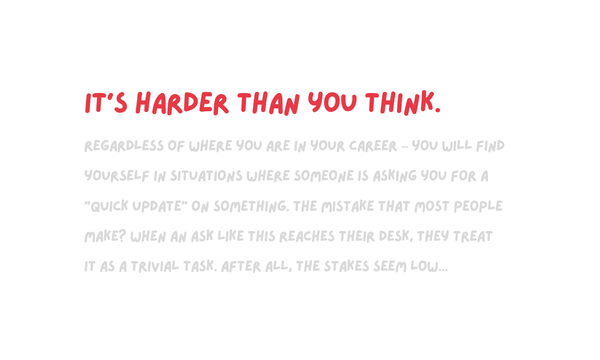🧠 How I make people listen to what I say.

There is nothing more frustrating than when you pour your heart and soul into delivering a point of view to someone – and receive silence or inaction in return.
(We've all been there. People won't tell you you're wrong or that they disagree. They just simply...move on.)
Actually, one thing is more frustrating.
And that is being completely unaware why this is happening, and repeating the same mistake over and over again.
After all, few people are honest enough to tell us things like:
Your response was too complicated; I just want a simple answer.
Your email was too long; I lost patience and didn't read it.
You said so many things; I can't tell which ones matter.
You wasted half the meeting presenting slides I don't care about.
And therefore we keep making the same mistakes, over and over again.
But that need not be the case. Here are 3 things I do to maximize the effectiveness of my verbal comms. Feel free to steal with pride:
🔽 Table of Contents
#1 Use verbal cues to hack yourself.
Most people are too long-winded when they speak. They refuse to lead with the conclusion.
(The reason is simple. It feels unnatural and illogical. It feels like you've built the roof first before building the floor.)
So if the question goes:
- "How confident are you that we can hit our sales target this quarter?"
They'll say:
- We have visited and revisited all our clients to ask for budget...
- We have also sought out market intel to understand macro trends...
- We analyzed the data to seek out more opportunities...
- ...and we still don't think we can make up the remaining gap.
This is extremely logical. Yet unfortunately extremely frustrating for the listener, who is in limbo while waiting for you to cut to the chase.
Of course, in the responder's defense: many things are difficult to summarize with a short answer. Many things are of the "yes, but..." or "no, except that..." variety. You don't want to mislead people by saying something that hasn't been qualified or caveated. I get it.
But leading with the conclusion is how you make sure people actually listen. No one has the patience for a long-winded buildup (unless you're a character in an Agatha Christie novel).
Thankfully, the fix is simple. Just use verbal cues to "hack" yourself.
For instance, the go-to phrase I use for myself is:
The tl;dr* is this...
*tl;dr = too long; didn't read
When I start a sentence with "The TLDR is this," it forces me to lead with the conclusion (to put my interlocutor at ease), but also signal that what I'm saying is over-simplified ("so please don't cut me off before I give you sufficient context").
Then I proceed with my caveats, my rationale, or other supporting detail.
Your magic phrase doesn't have to be "tl;dr." For instance, you can say:
"Short answer is [abc]. Long answer is [xyz]."
Sometimes I even switch it up. I might say something like:
"The answer is yes, but with a tiny asterisk. We believe we can meet the quota, but contingent upon X feature launching in time. Let me also take a minute to talk you through the details so you have a better sense of our confidence levels."
If you don't lead with the conclusion, your reader is left with an unscratched itch. Even if you help them scratch that itch at the end of your spiel – it will not have been a pleasant experience.
So use verbal cues to force yourself to lead with the conclusion (but also signal to the listener that there's more nuance). It'll make a world of difference.
👋 Subscribe for free to get Herng's newsletter directly in your inbox.
#2 Signpost when you talk.
Signposting involves using a variety of cues to help your reader or listener follow along much more easily. Wes Kao has a fantastic post on it.
Signposting comes naturally when we write. For instance:
- We use headers, sub-headers, and other titles to help the reader follow along
- We use formatting (bolding, italics, coloring)
- We use explicit verbiage to signal intention, e.g.
- For context...
- Up until this point, this was true. However...
- In short...
- Contrary to...
However, when it comes to speaking: people forget to signpost all of a sudden.
After all, everything makes sense in their heads. They don't realize the listener needs some help to follow along.
Here are two things I do to avoid this mistake.
The first (and simplest) is to stick to this three-step process:
- Tell them what you’re going to tell them...
- Tell them...
- Tell them what you’ve told them.
Doing so does wonders. For instance, I might say something like:
- I'd like to take the next 2 minutes to flag an issue we've been facing this past quarter, and give you an example of how it hurts our business...
- (I then deliver my spiel...)
- The example I've given you illustrates how not fixing this small thing could cause us lots of $ in the long run. My ask to this group is that we prioritize solving this within the next 30 days.
The second thing I do is to give the "meta-message" up front.
For instance, I start by saying things like:
- "I don't need any action from you; I just want to share to give you more context in case helpful."
- "I don't need you to help me problem-solve; I just want to think out loud and bounce ideas off you."
- "I'd like to explore whether you are the right person to partner together on this, which is why I'd like to give you the full context first."
When I do this, my audience immediately knows what part of their brain to switch on. They also know whether they need to chime in with questions.
It is astounding to me how many people engage in a conversation by simply jumping into their spiel, with no mention of why the listener should care.
A patient listener will listen on without interrupting – but half of his mindspace will be spent wondering:
- ...Are they explaining this b/c they plan to ask me for a favor?
- ...Are they sharing this because they want my help in brainstorming?
- ...Are they sharing this b/c they simply want to keep me in the loop?
A less patient listener will zone out. Or they'll ask a bunch of questions that they never would've asked if they knew of your true intention.
And it becomes a waste of time for both sides.
Note that this also applies if you're in a group meeting. For instance:
- "I'd like to share one issue that is specific to my business for now, but could be a hidden risk in the future for others in the room."
All of a sudden people in the room know why they should care.
On the other hand, if you're not able to signpost your own message and justify why others should listen to you, you should ask yourself: "Why am I even speaking?"
You might then realize you didn't really have to take up other people's time.
And this is equally valuable: not only did you preserve other people's time, you also avoided saying low-value-add stuff. That makes other things you actually say that much more impactful.
#3 Focus on principles, not tactics.
Common pitfall that trips a lot of people up (myself included):
Debating tactical decisions, rather than principles.
Here's an example. Imagine that you're discussing with a colleague how to best design seller incentives for a sales org.
Tactical questions include:
- Do we announce the incentives via email or at a live townhall?
- Do we track payouts in real-time or at a fixed cadence?
- Who is on point for the escalation channel?
Tactical questions aren't unimportant. But they're tactical and (often) secondary. And they can't come at the expense of establishing fundamental principles. Otherwise you'll get nowhere.
What are principles-based questions? Examples:
- What trade-off's do our incentives create?
- Do the incentives jive with our org principles?
- Have we optimized for fairness & transparency?
Here's an easy trick to save others (and yourself) from over-fixating on tactics:
Label, explicitly.
For instance, if you sense someone going down a rabbit hole in a meeting, you can say things like:
I'd love to come back to this point you raised just now, because it does matter for execution. However, could I suggest we park tactical decisions aside first, and discuss....
You can also say stuff like:
I'd love to take a step back and discuss the bigger picture here...
Of course, sometimes tactical decisions are important – in which case you can pre-qualify what you're saying, so people know that you're fully aware (and that you don't intend to distract):
This is a rather tactical point, but I wanted to flag it to this group because it is rather time-sensitive...
Labeling is important, and extremely helpful. Just make sure you do it carefully – after all, you don't want to come off as condescending or dismissive.
♻️ If you found this useful, feel free to share it with your friends and colleagues. Thanks for reading!


